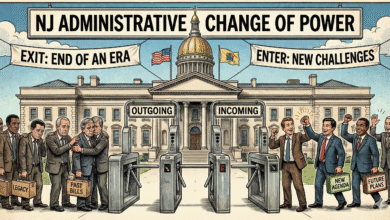The Audible Enigma: Is the Tech Giant a True Partner to Black Newark?
Newark, NJ – In the heart of Newark, a city rich in Black history and culture, stands the global headquarters of Audible, the Amazon-owned audiobook and podcast behemoth. Its presence is a powerful symbol of the city’s tech ambitions. To the outside world, Audible represents corporate investment, innovation, and a commitment to urban revitalization. But to Newark’s Black community, the company is a complex and often opaque enigma. The central, pressing question remains: Is Audible a genuine partner in building generational wealth for the community it calls home, or is its presence a gilded form of gentrification, creating a city that is in Newark but not for Newarkers?
This updated report focuses squarely on Audible’s double-edged impact, moving beyond broad strokes to examine the specific promises made and the data yet to be seen.
The Promise: A Portrait of a Good Corporate Neighbor
Audible has invested heavily in crafting a narrative of deep community engagement. Its corporate citizenship is most visibly expressed through its “Global Center for Urban Innovation,” which pledges to amplify the company’s community and economic initiatives. This commitment is backed by tangible programs:
- Newark Working Kitchens: A widely praised initiative launched during the pandemic, which has delivered millions of meals to residents in need by activating local, minority-owned restaurants.
- Spectrum and Belonging (S&B): The company’s internal framework for diversity, equity, and inclusion. This is supported by employee-led Impact Groups, most notably the Black Employee Network (BEN@), which is tasked with providing a platform for Black employees to influence content and company policy.
- Local Hiring and Development: Audible publicly promotes its “Returnship” program for caregivers re-entering the workforce and touts pathways for its customer care employees, many of whom are local, to transition into higher-paying tech roles.
On the surface, these initiatives paint a picture of a corporation that cares. They suggest a deep understanding of its role as an anchor institution in a majority-Black city. However, the true measure of partnership lies beyond well-marketed programs.
The Peril: A Fortress of Opaque Data
Despite its public-facing commitment to diversity, Audible’s transparency stops at the doors of its headquarters. The most critical data points—the ones that would definitively measure its impact on the local Black community—remain conspicuously absent from the public record. While parent company Amazon releases high-level diversity statistics, Audible does not provide specific, granular data for its Newark location.
This opacity makes it impossible to answer the fundamental questions:
- Who Gets the Wealth-Building Jobs? What percentage of high-paying software engineering, product management, data science, and senior leadership roles at the Newark headquarters are held by Black residents of Newark?
- Is Local Hiring Equitable? Does local hiring disproportionately fill lower-wage customer service and administrative positions, while lucrative tech and executive roles are filled by commuters from outside the city?
- Is the “Pathway” a Reality? How many customer care representatives have successfully transitioned into technology roles, and what is their average time-to-promotion and salary increase compared to external hires?
Without this data, Audible’s narrative of equity remains an unproven assertion. The promise of economic uplift is meaningless without the proof of wealth distribution. For the Black community, this lack of transparency is a critical red flag, suggesting that the company’s impact may not align with its marketing.
The Audible Footprint: Revitalization or “Jobless Gentrification”?
As Newark’s largest private tech employer, Audible is an undeniable engine of the city’s downtown transformation. The influx of high-salaried employees has spurred development, from luxury apartments to upscale retail. But this revitalization comes at a cost. Researchers have pointed to the phenomenon of “jobless gentrification,” where investment drives up the cost of living for long-term residents without a corresponding growth in accessible, high-wage jobs for them.
Audible’s presence accelerates this trend. The very prosperity it generates can contribute to the economic pressure that displaces the city’s Black residents, who face rising rents and property taxes. The new, gleaming Newark that caters to a tech workforce earning six-figure salaries becomes increasingly unaffordable for the median household. The unspoken story is one of displacement, where the community that gave Newark its cultural identity is slowly priced out of its own future.
A Call for True Partnership
The story of Audible in Newark is a microcosm of a national debate about the role of Big Tech in urban America. A true partnership cannot be built on philanthropic initiatives alone. It requires a transparent commitment to local economic empowerment.
To be the corporate partner it claims to be, Audible must move beyond curated stories and provide the hard data. It must open its books and show the Black community of Newark precisely how its presence is translating into tangible, generational wealth.
Until then, Audible remains an enigma. Its headquarters may be a beacon of Newark’s tech future, but for the Black community, the light it casts reveals as many shadows as it does promises.
